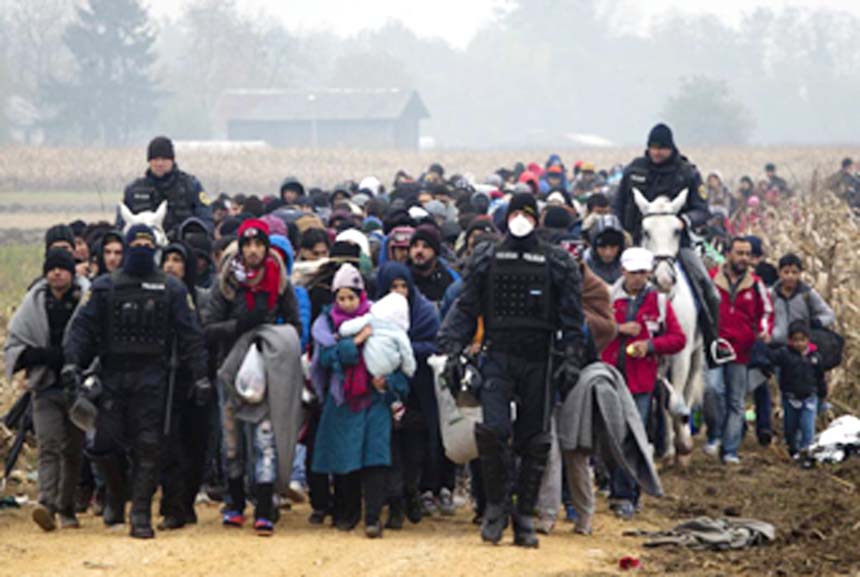
AFP, Ljubljana :
Europe’s worst migration crisis since World War II risks triggering “tectonic changes”, a top EU official warned Tuesday, as figures showed more than 700,000 newcomers have reached the continent’s Mediterranean shores this year.
“The situation will deteriorate even further,” European Council president Donald Tusk said, warning of a “new wave of refugees (arriving) from Aleppo and other Syrian regions under Russian bombardment”.
“I have no doubt that this challenge has the potential to change the European Union we have built,” he told the European Parliament in Strasbourg.
“And what is even more dangerous, it has the potential to create tectonic changes in the European political landscape. And these are not changes for the better.”
European Commission president Jean-Claude Juncker meanwhile slammed EU member states for providing less than half of the guards pledged to the bloc’s Frontex border agency in migrant hotspots Greece and Italy.
“Member states have been moving slowly at a time when they should be running,” he said.
Of the 775 border guards needed, EU countries have only provided 326 over the past month, Juncker said, adding that many bloc members had also failed so far to keep their promises of financial support.
The stinging criticism came after the EU vowed to help set up 100,000 places in reception centres in Greece and along the migrant route through the Balkans as part of a 17-point action plan devised with the countries most affected by the crisis.
German Chancellor Angela Merkel and French President Francois Hollande held talks in Paris on Tuesday, with a French official saying afterwards the two shared “the same position on what should be done politically and… on the front line”.
Vienna report adds: Austria will build a fence along its border with fellow EU member Slovenia to slow down the migrant flow, Interior Minister Johanna Mikl-Leitner said Wednesday.
Both countries are part of the passport-free Schengen zone and have been key transit countries for tens of thousands of refugees and migrants desperately seeking to reach northern Europe via the Balkans.
“This is about ensuring an orderly, controlled entry into our country, not about shutting down the border,” she told public broadcaster Oe1.
The politician of the conservative OeVP party added that the situation risked escalating as people were forced to wait in freezing temperatures for hours before being allowed to cross from one nation into another.
“We know that in recent days and weeks individual groups of migrants have become more impatient, aggressive and emotional. If groups of people push from behind, with children and women stuck in-between, you need stable, massive measures,” Mikl-Leitner said.
On Tuesday, the minister had already hinted at the fence during a visit to the Spielfeld border crossing, saying that she was considering “structural measures” to be implemented at the checkpoint.
Last week, she drew strong criticism from opposition members for saying that it was time for the EU to “build fortress Europe”.
But the Socialist Democrats (SPOe), who are in a ruling national coalition with the Conservatives, on Wednesday appeared to side with Mikl-Leitner.
SPOe Defence Minister Gerald Klug said he could imagine barriers and containers at the Spielfeld border “to be able to control the migrants in an orderly manner”.
More than 700,000 people fleeing war and misery have reached Europe’s Mediterranean shores so far this year, with a majority coming from Syria, Afghanistan and Iraq.
From Greece, they begin a gruelling trek through the western Balkans and central Europe in the hope of reaching the EU’s economic powerhouse Germany, the preferred destination for many migrants.

